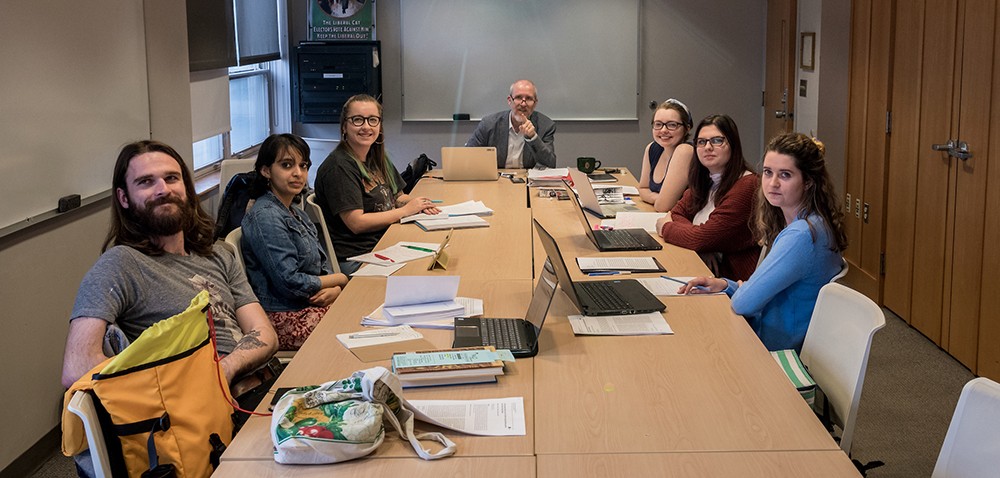MA IN LIBERAL STUDIES

The Master of Arts in Liberal Studies requires 30 credits or 10 three-credit courses, consisting of the following:
- Two proseminars
- Seven courses chosen from graduate course offerings in the College of Liberal Arts and Sciences
- Directed Readings capstone course (three credits)
- Qualifying Portfolio
The College of Liberal Arts and Sciences offers almost 200 courses in the humanities and social sciences to choose from across the curriculum. Almost all courses are offered in the late afternoon and evening. To ensure a breadth of exposure to multiple disciplines, students may take no more than three courses in any one graduate department.
All courses, including the Directed Readings requirement, will be selected by the students in consultation with their academic advisors. It is expected in completing the Liberal Studies program's requirements that the student will select courses that form an integrated course of studies, shaped by the student’s individual interests.
Students interested in further graduate study are strongly encouraged to enroll in a Research Methods course and should contact their academic advisor to learn more.
PROGRAM DETAILS
LST 7100 - Foundations: Fall Proseminar
LST 8000 - Directed Reading Seminar
LST 8100 - Independent Study & Research
CLA 7301 - Greek Archaeology
CSC 8200 - Health Informatics & E-Health Systems
CSC 8210 - Healthcare Safety Security Law & Ethics
EDU 8654 - Policy Analysis
EDU 8670 - History and Purpose of Higher Ed
EDU 8673 - Philosophy of Education
EDU 8869 - Spec Topics in Education: A Culture for Learning
GEV 7040 - Introduction to GIS
GEV 8000 - Natural Hazards
GEV 8003 - Environmental Policy and Management
HRD 8304 - Emotional Intelligence
HRD 8305 - Cultural Competency, Equity & Social Justice
HRD 8306 - Measuring Inclusion & Diversity Effectiveness
HRD 8307 - Work, Family & Career Considerations
HRD 8330 - Ethics
HRD 8345 - Relational Capital
HRD 8421 - Diversity in a Global Economy
MPA 8011 - Public Administration Theory
MPA 8021 - Leadership Ethics
MPA 8061 - Organization Theory
MPA 8800 - Managing Public Networks
PSY 8425 - Organizational Behavior
THE 8200 - Legacies of Revenge
THL 9620 - Seminar in Global Christianities
THL 8510 - Spiritual Not Religious
LST 7101 - Foundations: Spring Proseminar
LST 8000 - Directed Reading Seminar
LST 8100 - Independent Study and Research
CHR 7810 - Elite Admission & Scholarship
CHR 7815 - Alternatives to 4 Year College
CHR 8915 - Foundations of College Counseling
CLA 7301 - Alexander the Great
EDU 8619 - Children's Literature & Literacy
EDU 8664 - Politics of Education
EDU 8678 - Equity & Social Justice
ENG 8460 - Science & Fiction Before Sci-Fi
ENG 9520 - Writing & Indigeneity
ENG 9730 - Staging the Spanish Tragedy
GEV 7020 - Advanced Environmental Issues Seminar
GWS 8000 - Critical Perspectives on Gender
HIS 8016 - American Nation 1750-1800
HIS 8062 - Urban History
HIS 8800 - Visual Culture
MPA 8011 - Public Administration Theory
MPA 8021 - Leadership Ethics
MPA 8061 - Organization Theory
MPA 8200 - Strategic Communications
MPA 8550 - Urban Politics and Government
MPA 8600 - Effective Nonprofit Management
MPA 8700 - Fundraising for Nonprofit Organizations
MPA 8800 - Managing Public Networks
THE 7130 - Dramaturgy Modern
THE 7150 - Dramatic Vision and Form
THE 8540 - Collaborative Theatre Making
THL 8350 - Catholic Social Thought
THL 8390 - Christian Environmental Ethics
THL 8445 - US Catholicism: Historical and Contemporary Issues
THL 8710 - Educating for Mission
THL 9415 - Modern Christianity in History
Offered in the fall and the spring, the Proseminar series is a survey of the liberal arts featuring invited lectures from inspiring faculty across the disciplines. The Proseminars culminate in personalized course plans for the MA based on students' initial interests. The series also serves as an introduction to the skills and expectations which are consistent with graduate-level work in the humanities and social sciences.
The fall Proseminar emphasizes the development of graduate-level reading and writing skills. The spring Proseminar focuses on conducting and presenting graduate-level research.
Upcoming Proseminar topics may include:
- Identity and Representation
- Technology and Society
- Justice
- Religion, Health and Culture
- Collapse of Complex Civilizations
- Sex and Gender in Nature and Society
The Directed Readings course is conducted in the final semester before graduating and is of the student's own design. It should explore a topic that has developed out of the student’s graduate work in Liberal Studies; it should also be a subject which the student wishes to pursue in greater depth. In addition, the Directed Readings experience enables students to cap their graduate study with a culminating essay or project. Many students choose to write a thesis (roughly 30 pages long), but depending on the topic and research/analysis methods, other project models may be more appropriate. The students should work closely with their advisor to decide on the format of the project. But whatever form it takes, the final result of the Directed Readings should be a significant and tangible work of graduate level research and analysis.
In addition, the student should work closely with the advisor throughout the process of reading, research and writing. We recommend that the advisor set up a schedule with the student for the following submissions:
- Thesis or project proposal (4-5 pages)
- Reading list
- Outline of project
- Essay drafts
- Final version of project/thesis
The student should follow the deadlines in the Graduate Academic calendar for the submission of the final project/thesis.
The thesis should conform to the academic standards of the primary discipline (including bibliographic citation method, research methods, etc). In addition, because Liberal Studies encourages interdisciplinary methods, we encourage students to draw on other disciplines where appropriate concerning the topic and research.
The Qualifying Portfolio consists of four papers originally submitted to satisfy the requirements for seminars taken in their normal course of study during the student’s coursework in Liberal studies, plus a short narrative describing how and why the student chose these essays. The papers should be representative of the student’s best work; in addition, the papers should indicate the scope and trajectory of the student’s course of studies. If an essay was submitted for the student's Directed Readings, that essay may be included in the portfolio. The papers may but need not be reworked by students prior to submitting them as part of their portfolio.
The portfolio will be reviewed by a committee that includes the student’s Directed Readings advisor, the Director of Graduate Liberal Studies, and one other faculty member familiar with the student’s work. The portfolio should also be accompanied by a short narrative (no more than five pages) describing why the student chose these papers, and how these papers demonstrate the trajectory of the student’s work in Graduate Liberal Studies. There will thus be five items in the portfolio: four essays, plus the short narrative.
The committee will then judge the portfolio based on the following criteria:
- interdisciplinary breadth
- a clear sense of trajectory
- mastery of the skills of critical research and writing on the graduate level
A student may also propose to do an independent study on a topic that is not offered in Villanova's graduate course offerings. There is also precedent for Liberal Studies students to combine the Directed Readings course with an Independent Study to carry out a more ambitious culminating essay or project. The Independent Study replaces one of the disciplinary courses.
SAMPLE TRACKS
An American Studies track offers students the opportunity for the interdisciplinary study of America and American culture in an increasingly globalized world.
Past courses have included:
- Current Issues in American Education
- Mass Culture and the Modern American Novel
- The Harlem Renaissance
- 19th Century American Literature
- American Civil War Studies
- The Gilded Age
- Topics in Modern American Social History
- American Philosophy
- American Political Behavior
- Urban Politics and Government
- Catholicism in the United States: Past, Present, Future
An Ancient Worlds track allows students to gain a deeper understanding either of the intersections of ancient civilizations, such as Greece, Rome and Mesopotamia, or of one particular ancient civilization.
Past courses have included:
- History of Latin Literature
- Roman Drama
- History of Greek Literature
- Plato
- Greek Tragedy
- Ancient Mediterranean History
- Aristotle: Theoretical Philosophy
- Augustine’s Practical Philosophy
- History of Political Thought
- The Bible and Archeology
- Ancient Christianity
A Great Books track allows students to explore the great books of human civilization.
Past courses have included:
- Chaucer’s Canterbury Tales
- Victorian Prose
- Irish Literature before 1900
- American Fiction
- American Cultural History
- The Enlightenment
- Vergil
- Ovid
- Aristotle: Theoretical Philosophy
- Kant’s First Critique
- Nietzsche
- Sartre
- Liberalism and its Critics
- Topics in Political Theory
- Playwriting
- Catholic Social Thought
- New Testament in Context
A Peace and Justice track prepares students for careers in social justice, advocacy, peacemaking, conflict resolution, journalism, teaching and activism. Its focus is the development of leaders capable of assessing the conditions for creating social justice and maintaining peaceful relations.
Past courses have included:
- Intercultural Communication
- Multiculturalism, Gender and Inclusion in Schools
- Topics in American Economic History
- Industrial Revolution: Social Consequences and Ideologies
- The Impact of War on Society
- American Foreign Relations Since 1914
- Catholic Social Teaching and Peace
- Feminist Theories
- Political Philosophy
- Urban Politics and Government
- American Foreign Policy in the Middle East
- The Politics and Foreign Relations of Developing Countries
- Social Ethics
- Christian Ethics and Globalization

